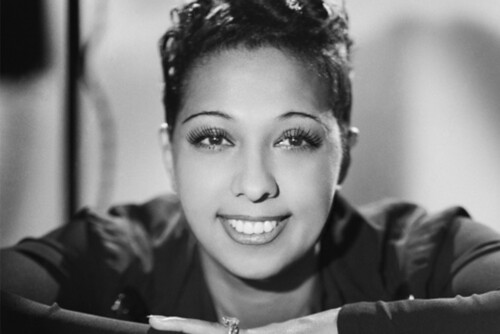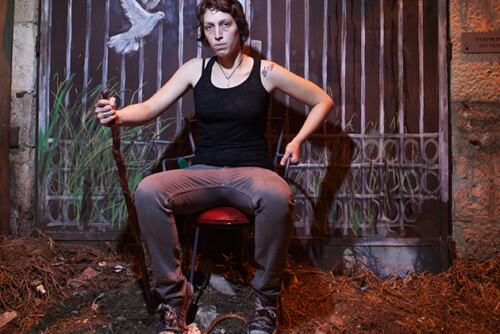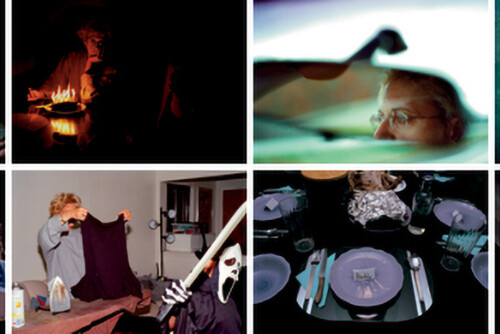These organizations continue this project because policing of communities that can be called deviant continues to the present day and is even intensifying in some respects. For example, in July of 2006 Washington DC Mayor Anthony Williams signed the Omnibus Public Safety Emergency Amendment Act, which allowed for prostitution free zones (PFZ) to be implemented throughout the district. Similar to drug- and gang-free zones created in the 1990s as a part of the continuing racialized, policed, militarized, and antipoor “war on drugs,” prostitution-free zones are marked by warning signs and cast a wide net of criminality over a host of identities (trans women, sex workers, and people of color) and actions (congregating in groups, waving at the corner, possessing condoms or cash).
Fears about the “prostitute” are often augmented by hysteria over the presence of people of color in public space who may be simultaneously eroticized, considered “dirty,” and security threats (e.g., “loitering” Latinos) (McArdle, 2001; Cleaveland and Kelly, 2008). Profiled as prostitutes with alarming frequency, transgender women of color are targets for arrest and harassment by police who act out societal stigma against gender-nonconformity (Amnesty International, 2005). Different frameworks can drive policing and surveillance of other forms of sex work, such as massage parlors. Police raids may be framed as “rescues” of trafficked women (Sex Workers Project, 2009), or they may be based on similar fears of congregating “illegal immigrants” who challenge public safety. 1
Trans justice activist Darby Hickey argues that the implementation of PFZs simply makes a de facto practice de jure. “The intent [of the PFZs] was to legitimize a practice the police have been doing for years, it was not new, it was just legitimized again in the law, not a whole lot changed, now police had an official phrase for doing what they have always done.” 2
Mallory Teefari, trans activist and harm reduction practicioner, has worked with street sex workers and in the DC trans community since the 1970s, and described the long history of attempts at social control by police:
All through the years the [Metro Police Department] sought means and ways to actually control the trans and sex worker market in Washington DC, by zones, by identification as workers, by means of ID-ing. […] Groups were formed like the DC Transgender Coalition, DC Care Consortium, and Transgender Health Empowerment, and activists started looking into reasons and ways to combat oppression and help the transgender community to deal with issues like health, legal issues of arrests—to try and understand the community that has basically always been an aspect of DC: a transgender street culture. 3
Organizations mobilized in response to the policing of sex workers in DC, the legislating of the PFZs, and to advocate for alternatives to policing. The Alliance for a Safe and Diverse DC was established in 2005 by community members and advocates in response to an assemblage of proposed laws targeting sex workers and those involved in street sex economies, such as the Prostitution Nuisance Abatement Amendment Act, the Omnibus Public Safety Act, and the Anti-Prostitution Vehicle Impoundment Amendment Act. 4 The Alliance for a Safe and Diverse DC established a community-based research team, which included many people directly impacted by the PFZs. Research team members had significant experience working on “topics of sex work, HIV, drug use, LGBT and immigrant communities, racism, homelessness and community organizing.” 5 The team conducted research over the course of 2007, and finished and published their findings in 2008. The research culminated in “The Move Along Report: Policing and Sex Work in DC” (PDF). The final portion of the report consists of a series of recommendations to the mayor and DC Council, the Metropolitan Police, US Attorney’s Office, the Office of Police Complaints, funders, sex worker organizations, and human rights advocates. The recommendations call for a, “city wide review of the laws, policies and practices regarding the policing and regulating of adult public sex,” and the report proposes that the PFZs be repealed or a moratorium enacted. However, in spite of these recommendations, DC police posted PFZ signs along 5th and I streets during the inauguration of President Obama, 6 and Prince George’s County recently adopted PFZs. 7 In November new legislation was also proposed to extend PFZs in Washington DC indefinitely. 8
Campaigns like that of the Alliance for a Safe and Diverse DC work to reshape the radical legacies of the Stonewall and Compton Cafeteria uprisings toward a still more expansively liberatory future. This future can be realized by standing in solidarity with—and taking direction from—the vibrant queer and trans organizing led by queer and trangender youth on the Christopher Street Pier in New York City (see FIERCE! article in this issue), as well as with campaigns happening south of New York City, like the sex workers in DC organizing against prostitution free zones or the trans women of color in Memphis, Tennessee organizing in response to the police violence against Duanna Johnson. Arrested in February of 2008, Johnson, a black transgender woman, was verbally and physically assaulted by police at the Shelby County Jail. She spoke out against the violence in the local news media and initiated a federal lawsuit against the Memphis police department for civil rights violations. 9 Nine months later, she was found murdered, execution style, near her home in North Memphis.
Unfortunately, many of the largest national LGBT organizations constantly recall and reference the liberatory and antipolice “Stonewall” riot as a battle cry for their homonormative agenda: marriage, military inclusion, access to the market, and hate crimes legislation. The narrow and singular pressure to accept this agenda and assimilate into mainstream society elides the rich and dynamic history of our movements for liberation and self-determination. A critical analysis about the dangers of aligning with the police, and an alternative practice of building real protection from violence in the form of strong and diverse communities, is part of that rich heritage. Remembering our radical history, and reclaiming ownership over it, is a powerfully transformative act of love for the value of our movements and our lives.
- Penelope Saunders and Jennifer Kirby, “Move along: community-based research into the policing of sex work in Washington, D.C” Social Justice Journal (Spring 2010): 2.[↑]
- Darby Hickey, interview by Che Gossett, written notes, August 18, 2008.[↑]
- Mallory Teefari, interview by Che Gossett, written notes, August 11, 2008.[↑]
- Saunders and Kirby.[↑]
- Alliance for a Safe & Diverse DC, “Move Along Report: Policing Sex Work in Washington DC” (PDF). (Washington DC: Different Avenues, 2008): 4.[↑]
- Marc Fisher, “Welcome To Inauguration Island, A Prostitution-Free Zone” Washington Post 17 Jan. 2009.[↑]
- Daniel Leaderman, “Prince George’s council OKs ‘prostitution-free zones,’ strip club bill” Gazette.net 16 Nov. 2011.[↑]
- Martin Austermuhle, “The District: Soon To Be Permanently Prostitution-Free?” Dcist.com 3 Nov. 2011, accessed January 18, 2012.[↑]
- Robbie Brown, “Murder of Transgender Woman Revives Scrutiny” New York Times 18 Nov. 2008; Associated Press, “Tennessee: Ex-Officer Is Indicted” New York Times, 20 Nov. 2008.[↑]



